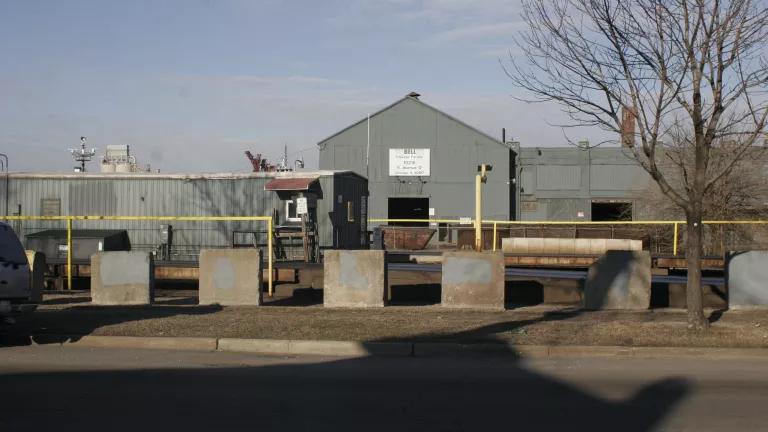Pollution to Prosperity: Chicago's Path to a Healthy Future
We are fighting to move from pollution to progress in Chicago with a series of important ordinances that address cumulative impacts, clean buildings, and clean drinking water.

S.H. Bell Manganese Southeast Side
Ivan Moreno
A giant shift is on the horizon for environmental justice in Chicago. Advocates have fought for years to end environmentally racist policies that created sacrifice zones, where toxic industry has been allowed to accumulate in communities of color.
We are fighting to move progressively forward in Chicago with a series of important ordinances, including policies that address cumulative impacts, clean buildings, and clean drinking water.
All of these reforms are linked together by their focus on environmental justice.
The decisions of Mayor Brandon Johnson’s administration and our city council will resonate for generations, shaping the trajectory of health, equality, and sustainability. Our mission is clear: to forge a path from pollution to progress.
Chicagoans are not accepting falling further behind in health and wealth, in safety and well-being. The time for change is now.
By embracing an agenda centered around clean buildings, lead service line replacement, and cumulative impacts, Chicago can pave the way for a future defined by resilience, inclusivity, and prosperity.
The call for action has been decades in the making for the environmental justice community. Black and Latine communities, which have historically borne the brunt of environmental burdens, are demanding that promises to end sacrifice zones come to fruition. We deserve policies and practices that recognize our power, honor our resilience, and amplify our voices.
Cumulative impacts: Ending sacrifice zones in Chicago
Chicago's communities of color bear the marks of the cumulative impacts of pollution. I’ve seen this firsthand as a lifelong Southeast Sider. Our community is surrounded by industrial facilities that pollute our air. Life expectancy for Southeast Side neighborhoods is two to nearly seven years shorter than in Lincoln Park.
All three Southeast Side community areas rank in the bottom half of Chicago’s total community areas for life expectancy, cardiac and respiratory disease, and self-reported health, among other metrics. We recently faced the most intense environmental justice fight of our lives when we successfully stopped General Iron, a massive car-shredding facility, from moving into our neighborhood.
The cumulative impacts ordinance will acknowledge these historical imbalances and set forth a road map for equitable change. By directing resources, protections, and attention to the communities that have borne the brunt of environmental injustices, Chicago can begin to bridge the gap in environmental justice and uplift all of its citizens.
Lead service line replacement: Safeguarding generations to come
Hidden beneath the surface, a silent threat to safe drinking water lingers in the form of more than 400,000 lead-laden service lines. These inconspicuous conduits can have dire consequences for public health, particularly for the most vulnerable communities. Lead can cause irreparable damage, especially to the growing minds of children. The proactive lead service line replacement policy will take a decisive step toward mitigating this risk, seeking to eliminate the potential for lead contamination in drinking water. In doing so, Chicago not only protects its residents but lays the foundation for a healthier and more resilient tomorrow.
Clean buildings: Creating healthier homes
Amid the towering skyscrapers, historic architecture, and residential buildings, the quality of indoor air is often overlooked. Yet it is within these walls that Chicagoans spend the majority of their lives. The clean buildings policy stands as a beacon of change, advocating for improved indoor air quality through enhanced ventilation systems and energy-efficient practices. By addressing this overlooked aspect of daily living, Chicago can ensure that the very air its citizens breathe nurtures their well-being rather than jeopardizing it.
Uniting these policies
In uniting behind these policies, Chicago can set a national example—a testament to the city's commitment to progress and justice. Disadvantaged communities like mine will no longer be left behind; instead, they will lead the charge toward a future where health disparities are narrowed, economic opportunities are expanded, and the well-being of all citizens is prioritized.
These are not mere policies; they are promises that Chicago will no longer tolerate a status quo that perpetuates inequality and endangers health.




